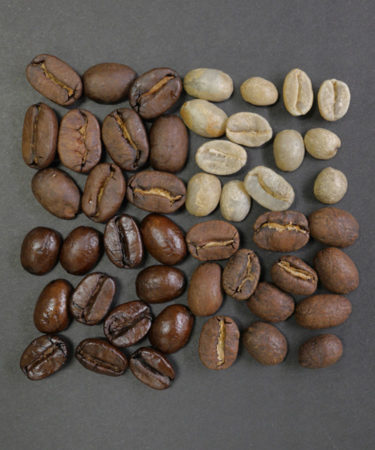“This didn’t used to be coffee,” says Phanpaiboon (Nud) Panudcha, a tour guide for Exotic Voyages, gesturing toward an expanse of neatly plotted land. “This used to be all opium fields. That’s why they call it the Golden Triangle: Gold was exchanged for opium, and people got addicted. It was very sad,” she says.
Southeast Asia’s Golden Triangle spans the borders of Thailand, Laos, and Myanmar. In 1983, the Thai royal family developed an initiative to transform Thailand’s agricultural footprint in the area, providing farmers with Arabica plants and coffee-growing education.
“The Queen Mother [Sirikit Kitiyakara] really pushed to have coffee planted to replace opium, and was quite successful at it,” says Blake Dinkin, founder of Black Ivory Coffee. Born in Canada, Dinkin runs Thailand’s Black Ivory label, which is said to be the most expensive coffee in the world.
Coffee changed the landscape, Dinkin says, bringing a new wave of young farmers and agricultural practices to the region. By the 1990s and early 2000s, the Thai coffee industry was flourishing. In addition to Arabica, Thai farmers started growing Catuai, Typica, and other coffee varieties, and developed proprietary blends.
Dinkin believes emphasizing specialty coffee will give Thai coffee farmers advantages in the market, especially given the increased competition from neighboring countries. (Laos and Myanmar are “really trying to improve their Arabica crops,” he says.)
To that end, in 2014, the country introduced Specialty Coffee Association of Thailand, formerly known as Good Quality Coffee Group. The organization’s main mission is to promote the value of quality coffee to Thai farmers and agriculturalists.
It’s working — perhaps too well, Dinkin says. As demand for locally grown coffee grows, farmers are quickly realizing they can fetch a higher price for their goods from mills and roasters. Dinkin worries coffee mills could start churning out subpar beans to turn a quick profit, and damage the reputation and sales of quality Thai coffee in the process.
“Some of these buyers just want as much coffee cherries as possible so they can run their mills at capacity. This means they buy lower grade but make few demands from growers,” he says. “For many of them who think short-term, they would rather sell their entire crop hassle-free even though cheap coffee will make them more susceptible to foreign competition in the future.”
This is particularly sensitive because Thailand has a sizable coffee market. Residents currently consume more coffee than Thai farmers produce, and less than 1 percent of all coffee grown in Thailand is exported.
Still, Dinkin insists the growing craft coffee movement is beneficial to Chiang Rai.
“Coffee culture is definitely growing. Even in small villages one can find cafes,” Dinkin says. “It is trendy, but I think it is sustainable in that more people — especially the younger generations — are drinking coffee.”
According to the Specialty Coffee Association of Thailand, the coffee boom is poised to continue. Thanks to the excellent quality of life coffee farming offers in Thailand, many farmers are young, in their 20s and 30s. They are eager to impart lessons from their university educations to the trade.
“Eight years ago, it was hard to find consistency with the farmers or mills. Now, in contrast, you have micro lots and processors who are experimenting with fermentation techniques,” Dinkin says. “You also have farmers converting other crops to coffee.”
